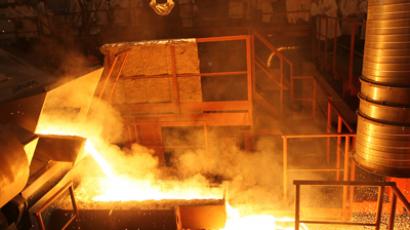Iran retrenches as EU oil import ban takes shape
Oil prices jumped to 9-month highs when Iran threatened to cut supplies to UK and France, and saying some other European destinations could fall victim. Yet for Teharan it doesn’t mean more cash, but a move back to barter with its foreign customers.
Iran may return to barter in its trade settlements with foreign partners. The country is seeking to keep its economy afloat, when most of dollar and euro denominated banking operations were blocked as a part of financial sanctions from the West.Trading in local currencies, such as roubles, rupee and yuan, as well as bartering deals with oil and gold are a possible option Tehran is mulling. The country has already settled in barter, as well as in yuan the purchase of around 1.1 million tons of grain on international markets. That’s after Iran was refused access to the SWIFT banking network, through which most trade operations have been traditionally settled.Also, in reply to the EU decision to stop buying Iranian oil in July, the country said it would halt crude exports to UK and France. Oil prices jumped to a 9–month high on the news, with WTI currently trading at about $105/bbl and Brent now standing at above $120/bbl.However, the price rally isn’t likely to last long, and some decision should have been made by summer, says Vladimir Rojankovsky, head of equity research at Nord Capital.It’s a purely geopolitical issue, “a very delicate diplomatic game,” the expert adds. And neither of the parties will be hit hard by the announcement from Iran.Iran supplies about 18% of its oil exports to the EU, so, France and Great Britain constitute no more than about 7-8% of the total Iran’s supplies, Rojankovsky explains.“Even if Iran loses those 18% of its supplies to Europe, it can easily make up for this by exports to China and South Asia,” he told Business RT.And the announcement from Iran definitely shouldn’t shock the EU countries, as the states agreed to stop importing Iranian oil back in late December. This means that after the existing contracts expire, no new ones will come from Europe. And EU in turn says oil companies such as Total, Royal Dutch Shell, Repsol and ENI have indeed either stopped buying Iranian oil or refused to get it on a spot market.Most likely, Iran just wanted to demonstrate the rest of the world it is powerful enough to announce this move first, Rojankovsky said.However, should Iran apply its sanctions to Germany, Portugal, Spain, Italy and Greece – the story could take a far more serious turn. The latter 3 economies are the key consumers of Iranian oil in Western Europe, with Greece getting more than 25% of its imports from the Islamic Republic.














